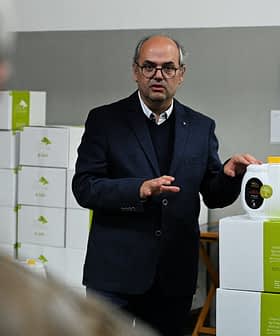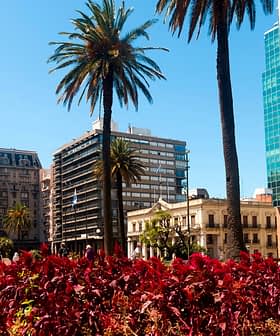According to a new study from a team of researchers in Poland, individuals who consume diets high in polyphenols and other bioactive compounds have a reduced risk of contracting Covid-19.
The study examined the relationship between the consumption of bioactive compounds in extra virgin olive oil, gut microbiota, and the risk of contracting Covid-19 in healthy Polish adults.
“There are currently no human studies available evaluating the effectiveness of higher dietary polyphenol, lignan and phytosterol intake in reducing Covid-19 risk,” the researchers wrote in the study, which was published in Frontiers.
See Also:Health News“However, the antiviral efficacy of polyphenols, including lignans and plant sterols, has been confirmed against SARS-CoV, MERS-CoV, Ebola virus, HIV, influenza virus and other viruses causing respiratory tract infections,” they added.
The researchers said plenty of evidence suggests that following plant-based diets is an effective strategy to prevent infections and noted that this was likely due to bioactive compounds shaping the immune response by promoting a healthy gut microbial composition.
“Specifically, the antioxidant constituents and anti-inflammatory agents of diet such as polyphenols and phytosterols have been shown to possess antiviral and immune-boosting properties,” they wrote.
To better establish the relationship between polyphenols and the risk of contracting Covid-19, the study followed 95 participants – 73 men and 22 women — aged between 25 and 45 — with healthy body fat and body mass indices and no chronic diseases from July to December 2020.
The researchers made a dietary assessment based on standard self-reporting methods. The participants were not told to significantly change their diet from what they normally eat. At the time of the study, International Olive Council data show that olive oil consumption in Poland, a country of 38 million people, reached 11,300 tons.
By the end of the study, the researchers observed a decline in the risk of contracting Covid-19 inversely related to the consumption of bioactive compounds; as the consumption of polyphenols increased, the risk of contracting the disease decreased.
They added that the results were consistent regardless of age, total energy intake, sex, diet, smoking status, body fat, body mass index, physical activity and alcohol consumption.
“The results showed that higher intake of total polyphenols, specific lignans such as secoisolariciresinol and matairesinol, as well as total phytosterols and some subclasses: stigmasterols and β‑sitosterols was associated with a lower risk of Covid-19,” the researchers wrote.
“Habitual consumption of total polyphenols, secoisolariciresinol, total phytosterols, stigmasterol and β‑sitosterol was significantly lower among those who fell ill with Covid-19,” they added.
According to Ullmann’s Encyclopedia of Industrial Chemistry, β‑sitosterol makes up 75.6 to 90 percent of the total sterol fraction of olive oil, while stigmasterol makes up between 0.6 and 2 percent.
In the discussion of their findings, the researchers suggested a few reasons why higher polyphenol and bioactive compound consumption was associated with a lower risk of contracting Covid-19.
They wrote that induced cytokine release syndrome has been suggested to play a pivotal role in the pathology of Covid-19, noting that polyphenols and phytosterols inhibit the secretion of several pro-inflammatory compounds created by the hyperactivation of cytokines.
“Polyphenols can also enhance resistance to foreign pathogens through other inflammation-related pathways like activation of T regulatory cells, which can suppress cytotoxic T cell function,” the researchers added.
They also noted that polyphenols and phytosterols reduce cholesterol levels in the cell membrane, decreasing the availability of the main entry site into the cell for Covid-19.
“Numerous studies confirm that a diet high in plant-based products containing, among others, phytosterols naturally present in the cell membranes of lipid-rich plants (nuts, seeds, legumes, olive oil), is associated with a lower risk of infection and a milder course of Covid-19,” the researchers wrote.
However, the researchers highlighted the relationship between the consumption of polyphenols and other plant sterols and healthy gut microbiota as one of the most likely reasons for the healthful effects of polyphenols against Covid-19.
They said consuming polyphenols and phytosterols promotes the growth of beneficial microflora, such as Escherichia coli and Enterococcus. These bacteria are involved in producing the B and T cells that help the body fight viral infections.
According to World Health Organization data, there were more than 6.5 million confirmed Covid-19 cases in Poland, with nearly 120,000 deaths reported. Globally, the WHO said there have been 770 million cases of Covid-19 and nearly 7 million deaths attributed to the virus.
While recent data from the Centers for Disease Control in the United States suggest that the Covid-19 pandemic may be fading – average daily deaths in the country fell to the lowest level since 2019, before the spread of the virus in the U.S. – the researchers wrote that these findings should be considered by public health official preparing for future outbreaks respiratory tract viruses.
“The antiviral effects of phytochemicals, combined with well-established antioxidant, anti-inflammatory and anti-cholesterol activities, have proven to be effective in the prevention and treatment of Covid-19 and may provide an alternative or adjuvant solution to drug treatment,” the researchers wrote. “Especially since they show comparable effects and fewer side effects than pharmaceutical preparations.”
“The beneficial effects of polyphenols and phytosterols should be emphasized, and these plant-based compounds should be regarded in the context of their utility as antiviral agents preventing influenza-type infections,” they concluded.








